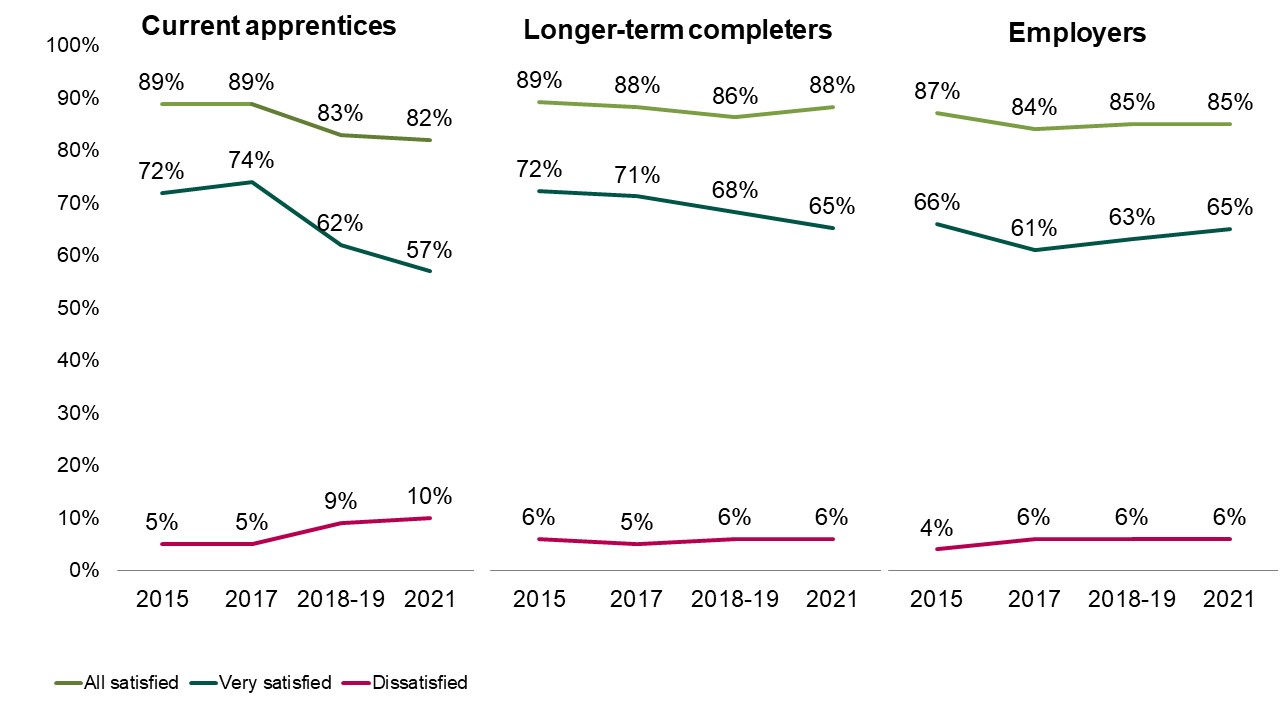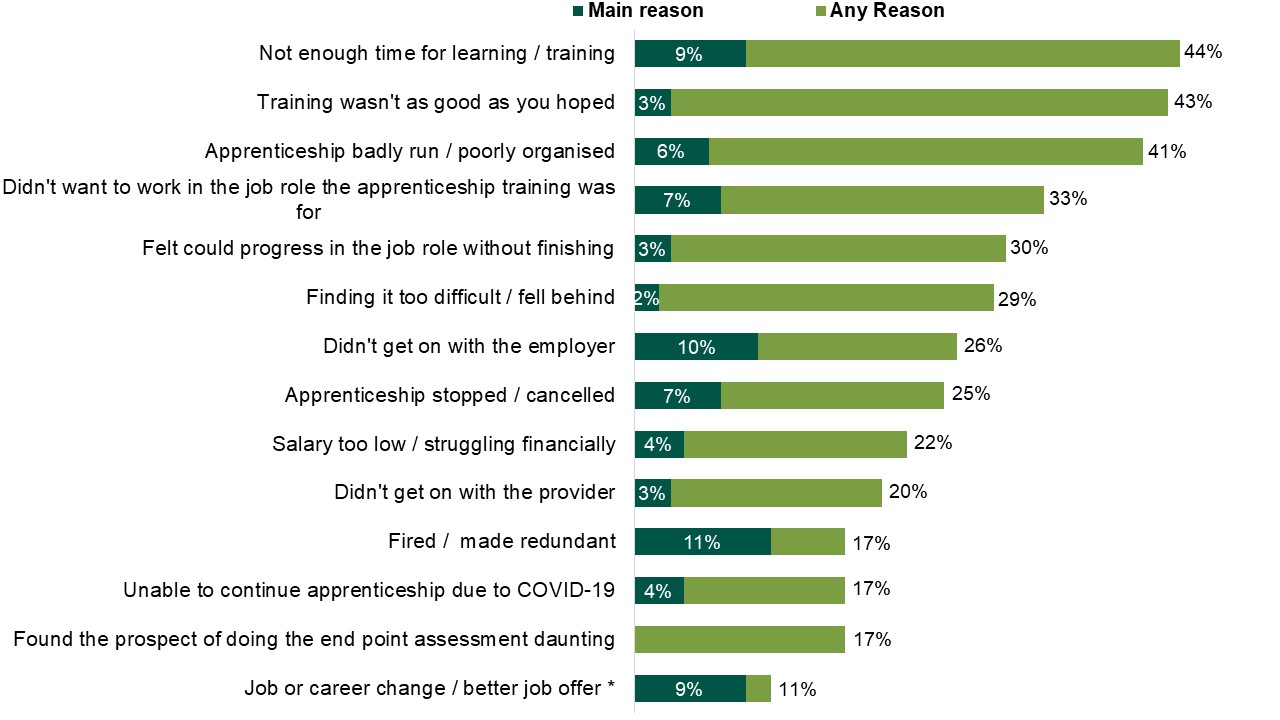
Overall satisfaction with apprenticeships remains high, found a recently published Department for Education study. Conducted by IFF Research, the Apprenticeship Evaluation 2021 explores the views of experiences of learners and employers involved in apprenticeships.
This is the seventh evaluation undertaken since 2012 and the first in the series to include questions for individuals that had withdrawn from an apprenticeship before completing (‘non-completers’) to identify their reasons for withdrawing. Overall, the evaluation comprised of 5,122 interviews with current apprentices and apprenticeship completers, 541 interviews with non-completers, and 4,085 employer interviews.
The data captured in the study enables robust time series monitoring of the programme, in particular with regard to quality, satisfaction, motivation, benefits, progression and post-apprenticeship retention. Its findings will help shape the future development of the apprenticeship programme.
Apprenticeships have decreased in number in recent years (from 521,000 in 2011/12 to 320,000 new starts in 2020/21, a fall of 39%), first following the policy reforms of 2017, and most recently since March 2020 with COVID-19. The impact of COVID-19 on apprenticeship delivery was evident in the learner findings, with over a quarter (27%) of current apprentices and recent completers* having experienced a pause in their training due to COVID-19. A similar proportion were furloughed at some point during their apprenticeship (two-fifths experienced either a pause or furlough).
Overall satisfaction with apprenticeships remains high for current learners (82% satisfied overall) but is lower than the levels found in 2015 and 2017 (89%). For longer-term apprenticeship completers* and employers, satisfaction levels have remained stable (88% and 85% respectively).
Overall satisfaction with apprenticeships

Source: Apprenticeship Evaluation 2021. 2021 Base: current apprentices (3,047) longer-term completers (1,039); employers with completer apprentices only (905). ‘All satisfied’ indicates a score of 6-10 given (on a 0-10 scale); ‘very satisfied’ a score of 8-10; and dissatisfied a score of 0-4.
Among apprentices who were dissatisfied, the main reasons were a lack of support or contact from the training provider; the apprenticeship being badly organised; and the poor quality of training received. Similar reasons concerning apprenticeship quality played a part in non-completers withdrawing from their apprenticeships – more than two fifths cited not spending enough time on learning or training, training not being as good as expected and their apprenticeship being badly organised as contributing factors when decided to withdraw.
Main and contributing reasons why non-completers did not complete their apprenticeship

Source: Apprenticeship Evaluation 2021. Base: All non-completers (541) Responses prompted unless statement ends with *
There were however many positive findings in terms of apprenticeship outcomes, with increases in the proportion of longer-term completers gaining skills related to their area of work (93% vs. 88% in 2018-19); communication skills (87% vs. 83%); the ability to work with others (85% vs. 80%); and digital skills (67% vs. 61%). The study also found that more longer-term completers in 2021 were working full-time at the time of interview than in the 2015, 2017 and 2018-19 surveys (81% vs. 74-75% in previous waves).
Employer views
Only 8% of sites of employment in England have current apprentices, indicating continuing potential for expansion. Despite the introduction of the Apprenticeship Levy, smaller employers (at site level) continue to make greater use of apprenticeships relative to their level of employment than all but the largest employers**.
Employers that did use apprenticeships remained generally satisfied – two thirds (65%) of those with completer apprentices were very satisfied, compared to 61% in the 2017 research. Satisfaction with the quality of applicants has also continued to improve over time (from 63% in 2015 to 70% in 2021).
Satisfaction levels in 2021 varied widely by type of apprenticeship:
Satisfaction with apprenticeship types among employers (rating 6 to 10 out of 10)
| Level 2 | Level 3 | Level 4+ | |
| Agriculture | 83% | 86% | * |
| Arts & Media | * | 83% | * |
| Business | 88% | 87% | 93% |
| Construction | 69% | 78% | 85% |
| Education | 90% | 91% | 87% |
| Engineering | 77% | 77% | 91% |
| Health | 89% | 87% | 88% |
| ICT | * | 88% | 85% |
| Leisure | 94% | 91% | * |
| Retail | 80% | 83% | 92% |
*Figures not shown due to low base size.
Two-fifths of employers of apprentices were aware that frameworks had been phased out in favour of standards. Those aware of the change were considerably more likely to think standards were an improvement (35%) than to think them worse (8%), though the majority felt there was either little difference (40%) or that it was too early to say (17%).
There was some uncertainty among employers about the end-point assessment (EPA) process: one in ten employers with apprentices who had completed standards (who will all have gone through EPA) did not think the apprentice had undertaken an EPA (and 9% were unsure), and many (63%) reported that they were not given a choice of EPA organisation by their provider.
* Recent completers are those who had completed their apprenticeship between March to December 2020, hence approximately 5-16 months prior to the being interviewed (1,036 interviews were conducted with recent completers). Longer-term’ completers are those who had completed their apprenticeship between July 2019 and February 2020, hence approximately 15-24 months prior to the being interviewed.
**While employers without apprentices did not take part in the survey, combining survey data on sector and size of companies with ONS data on numbers of businesses was used to produce estimates of the prevalence of apprenticeships among different types of company.